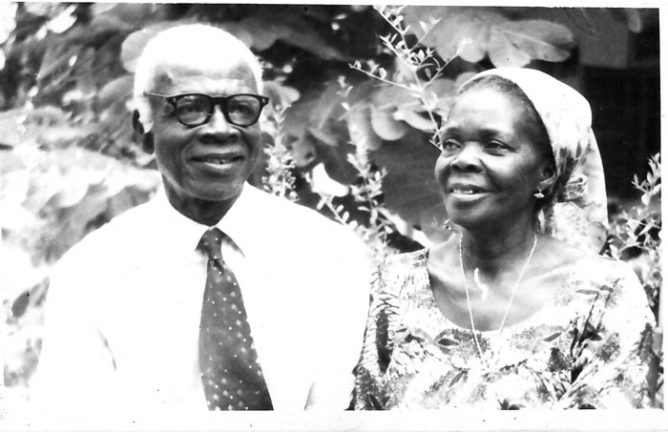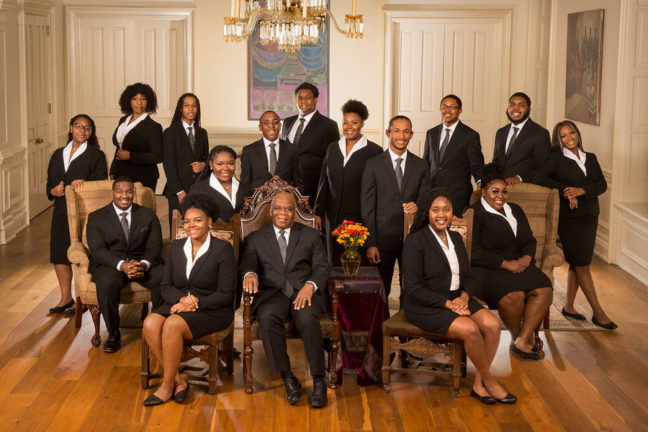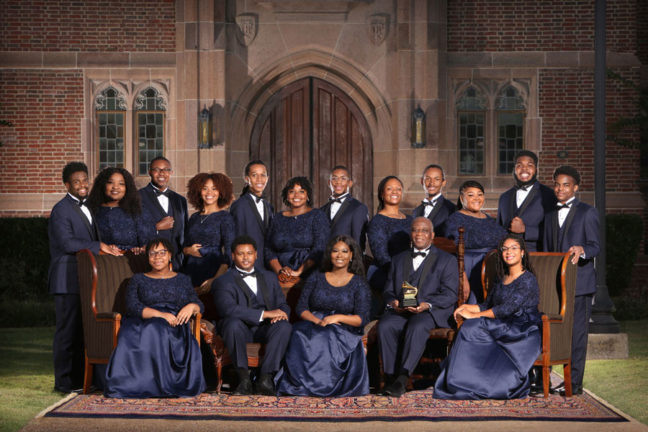With a passion for music, history, and preserving a legacy, Dr. Paul T. Kwami is at the right place at the right time as he mentors students and honors the 150-year musical legacy of the Fisk Jubilee Singers.
Dr. Kwami is committed to preserving the legacy of the Fisk Jubilee Singers, their songs, and helping people of all ages and all cultures to understand the legacy of their music and its importance.
Originally from Ghana, Dr. Kwami credits his parents for instilling the love of music in him. He shares a priceless story about his father’s role as a church organist and talks about how he found his way to the United States, Fisk University, and to become a Fisk Jubilee Singer. Dr. Kwami now proudly serves as a faculty member and director of the legendary group. In this podcast, you will gain insight into his dedication to preserving the music and heritage of this 150-year year old group as they take jubilee music and its message to audiences across the globe.
Q: As an immigrant to the U.S., what do you want others to know?
A: Sometimes, we think we can establish our own plans for our lives, but God always has a different plan for us, and it is very much so in my case, because as a student at Fisk University, I had completely different plans. I had no plan, in fact, to return to Fisk for anything — maybe to visit. But here I am a little over 27 years now, teaching and mentoring very young children.

Q: Between travel and rigorous academics for the students, what kind of challenges does that pose?
A: I am always concerned for my student because, first of all, they are students and will graduate with various degrees. They will not graduate with a degree in being Fisk Jubilee Singers. That leaves a huge responsibility on me. I always have to make sure that they are not over-tasked. Fortunately, we have a booking agent that takes care of our bookings, and we have a very good relationship. We communicate a lot, making sure that we don’t accept too many engagements that will affect the students’ studies.
But when students travel, I also make sure that they communicate with their teachers and that if there are assignments they have to do; they have information. And while traveling, they can take care of their assignments. I make sure they travel with at least one book, if it’s a weekend trip, so that they can also study.
On my personal level, it’s quite a responsibility … in thinking about several musical directors who have been in this position, I now have the responsibility of preserving this legacy, of preserving our songs, but also, I have the responsibility of helping younger people and people of our cultures to know about the Fisk Jubilee Singers, because I believe that this legacy is important not only to Fisk University, not only to Nashville, but in fact to the whole world.
Q: Do you kind of serve as a parental role and figure for some of these students, year after year?
A: Every year I consider the ensemble Fisk Jubilee Singers as a family. And therefore, it is my responsibility to make sure that I do whatever I can to make extra sacrifices, just to keep our students happy. Yes, I do find myself in that parental position at times… When I was young living in Ghana, one thing my father told me, because he was a teacher, is that I should always love my students.

Photo credit: Bill Steber and Pat Casey
Q: What can folks expect when they hear the Fisk Jubilee Singers perform?
A: People definitely should expect to hear beautiful melodies. I stress that word because I believe that it is because of the beauty of these melodies that people still enjoy them. The melodies are there with beautiful harmonies, but also when Fisk Jubilee Singers perform, I expect the audience to hear the messages or even to see with their eyes, the messages. I use the words, see the message, because I train my students to grasp a good understanding of messages in each song that they sing. I tell them to get married to the songs, to be so united with each song that when the songs are sung, it’s not just sounds and words that are coming out, but the sound must be mixed with emotions.
And those emotions can only be mixed with the songs when students really grasp the meanings of the songs and develop a personal relationship with them. When people listen to the Fisk Jubilee Singers sing, I expect them to receive whatever message is meant to be received during a performance.
Q: Do you think the music and the songs they sing might serve our nation in some fashion?
A: I can say that, yes, the songs that the Fisk Jubilee Singers sing are able to bring healing to the nation. When the original Fisk Jubilee Singers started traveling, they were not willing to sing these songs, the Negro spirituals, because the songs were very sacred to them. But when we think about the adverse situations that they ran into during that first tour, and yet were able to raise so much money, I’m always able to say that the Fisk Jubilee Singers sung these songs into the hearts of even people who may not have liked them at that time.

Photo credit: Bill Steber and Pat Casey
Now, we recently released an album that won a Grammy. This album was released in a time when there was a lot of unrest within the United States. But what I heard from people who listened to songs on this album was that the album was released at a very important time in the history of the United States, because people felt the love and peace that the songs actually carried. And so, I would say that even these days, these songs that were created by slaves still have the power and ability to minister the love and peace of God to listeners.
Q: The Fisk Jubilee Singers were awarded a National Medal of Arts from president and Mrs. George W. Bush then served as a bit of tipping point to educate others about their music. But the real tipping point was something else, wasn’t it?
A: In a way it was. But actually, the tipping point was during the pandemic, last year. We’ve had a partnership with Tennessee Performing Arts Center for maybe the past 15 years, whereby every year we performed for a group of students in the Nashville area. But because of the pandemic, we were unable to present a live performance. Instead, we filmed a concert, and that concert was broadcast — and I believe it’s still being broadcast on several PBS stations around the country. As a result of the responses I’ve received, I realized how important it is for us to continue sharing our story with younger people.
Q: You’ve taken the performers to some very well respected and hallowed halls, what stands out to you as the pinnacle of this success to date?
A: My mind immediately goes back to March of 2019. We were invited by the HT Burleigh Society in New York to perform in Zankel Hall, Carnegie Hall. It was an event that celebrated the lives of Harry T. Burleigh and Ella Sheppard, one of the original Fisk Jubilee Singers… [They were singing] songs that they knew and could sing very well on our campus, but here [in this venue] they could not sing. I mean, I was hearing terrible intonation, wrong words, and I really wondered … why? So, I stopped the sound check and said, ‘Everyone go and find a place and pray, then we will all come together and pray together before the concert.’ That’s what we did.
In recognizing remarkable locations where the Fisk Jubilee Singers have performed, Dr. Kwami shared high praise when speaking of the Nashville’s renown Ryman auditorium as a treasured venue with an attentive hometown staff.
Listen to this powerful podcast to learn how one individual, one teacher, one historian can bring history alive and change lives that will live on and inspire forever through the voices and song.


